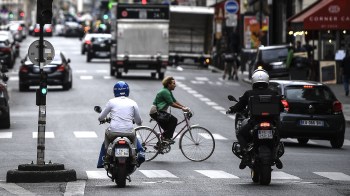Fighting for their right to parle français
Share Now on:
Fighting for their right to parle français
KAI RYSSDAL: A second…or even a third language…is almost required these days if you want to make a fast climb up the career ladder. Immersion programs are becomming more popular. French and Spanish of course. Chinese and Arabic, too. But what happens if learning a new language suddenly becomes a crime? In Algeria Arabic is the official language. But French is spoken for business. John Laurenson reports.
JOHN LAURENSON: Seven-year-olds at the Colombes, or Doves, primary school show off their flawless French:
[Student reads aloud in French]
LAURENSON: That’s very good. And can you speak any other languages apart from French?
[Student responds]
LAURENSON: What do you speak at home?
STUDENT [in French]: Just French.
Until now, almost all the teaching here has been in French — a “linguistic deviation” according to the Algerian president. He’s ordered Algeria’s 150 private schools to teach in Arabic or close. One-hundred-eight of them, including this one, have agreed — in principle at least — to comply. The other 42 can expect the police to turn up any day. They already closed some schools in spring before the government granted a temporary reprieve to let pupils complete the school year.
ABERRAME BELAID:“Ces ecoles, elles doivent se soumettre au programme du Ministere de l’Education Nationale . . . “
Aberramane Belaid is one of the old-school Algerian politicians who are proud of their French. He was a French teacher for 10 years and school principal for another 25 before becoming mayor of the neighboring town of El-Kseur.
But he insists a clampdown is needed. “It’s just about respecting the national curriculum,” he says. “Arabic is our national language. It has to be taught properly in all schools.”
Others say this new measure is a concession to the Islamists with whom the government has an uneasy peace. Whatever the cause, parents like Katia Kaci see a threat to their children’s future. Most high-paying jobs require French and that language also opens the door to work in France where opportunities are greater.
KATIA KACI [voice of translater]:“The system they’re creating is illogical because, when you get to university, if you want to study medicine, biology, architecture — anything scientific, at least — the teaching is practically all in French! So, inevitably, children who have been brought up only speaking Arabic are going to struggle. That’s why we’re demanding bilingual education for our children.”
SAMIR BENIKEN:“In some institutes such as the Faculty of Medical Science, 65 percent of the failures are due to the language problem.”
The founder and principal of Les Colombes school, Samir Beniken.
So, if Arabic-speaking kids are getting lost at French-speaking universities, isn’t the logical next step to make the universities use Arabic as well? Samir Beniken says no.
BENIKEN:“Arabic is not a language of technology. Everybody knows that. Everybody’s aware of that. A language is developed according to the economic growth of the country and also the industrial growth of the country. And, so far, the Arab countries did not reach that level in technology, so it would take years and years to have Arabic reach the international standards.
LAURENSON: You don’t have the vocabulary?
BENIKEN: Yes, we don’t have the vocabulary.”
Children rush out of class to a tiny playground. In rich countries, private schools are usually better off than their public counterparts. Not here.
Les Colombes, in a cheap and dusty part of town, actually shares its building with a bunch of private apartments. If parents are willing to pay even this school’s modest $600-a-year fees, it’s to give their children French.
To try and satisfy them and the government, school head Beniken is increasing teaching in Arabic, maintaining French for math and sciences, and crossing his fingers. The government says it’ll be sending out inspectors to make sure all schools tow the line.
In Bijaya, Algeria, I’m John Laurenson for Marketplace.

Pupils at a French-speaking school in Algeria. (John Laurenson)
There’s a lot happening in the world. Through it all, Marketplace is here for you.
You rely on Marketplace to break down the world’s events and tell you how it affects you in a fact-based, approachable way. We rely on your financial support to keep making that possible.
Your donation today powers the independent journalism that you rely on. For just $5/month, you can help sustain Marketplace so we can keep reporting on the things that matter to you.


















